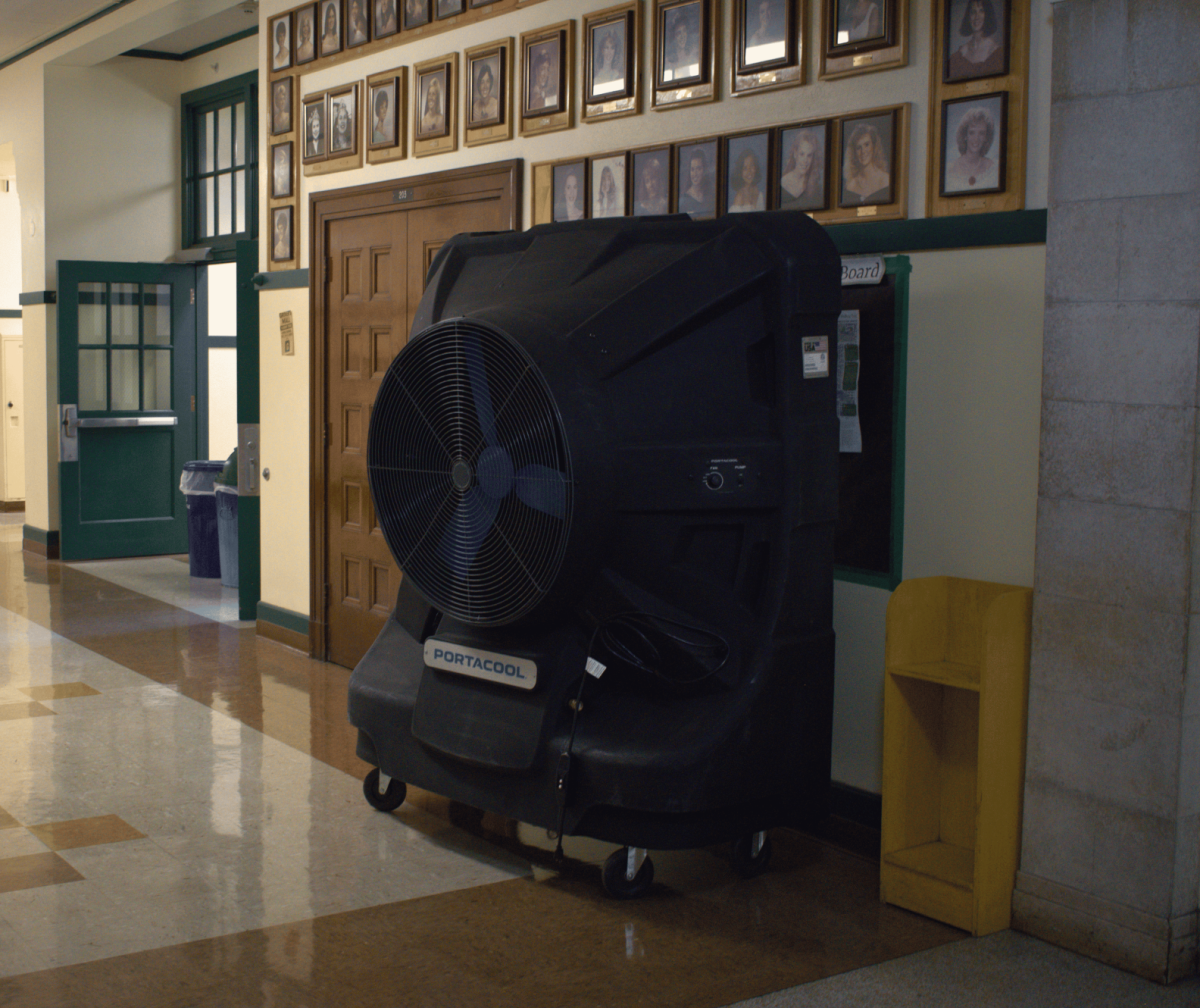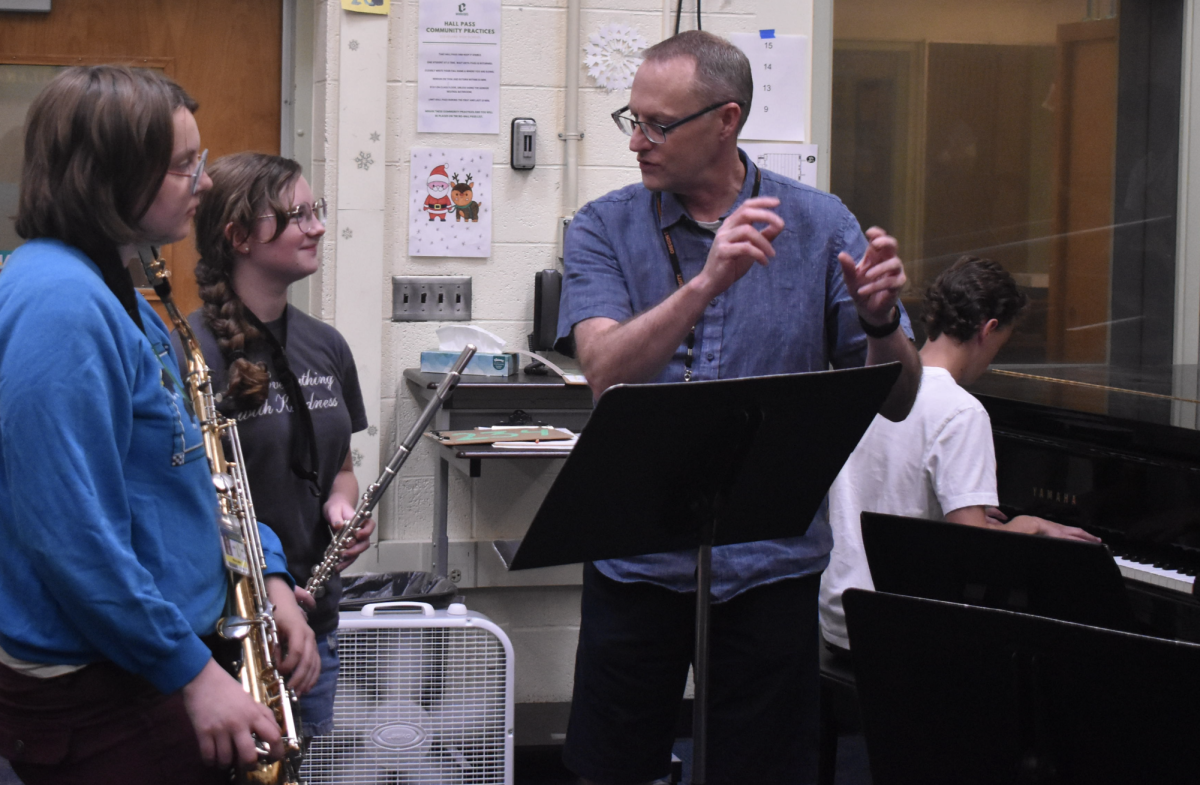Cleveland students returned to a sweltering school building on Aug. 27, and it only continued to heat up during the first two weeks of the new school year. Cleveland High School is among other schools in the PPS district that lacks air conditioning, making rising temperatures dangerous.
In fact, on Aug. 29 students throughout the district were released from school two hours early due to these concerns. Cleveland has since tried to mitigate the heat issue by putting rental fans in hallways and opening more windows to create airflow.
The east wing on the third floor of the school was especially affected by the heat.
According to Kieran Lemeune, a social studies teacher in the east wing, his room hit 87 degrees fahrenheit on the hottest day of the week.
“I went to bed with a headache and woke up the next day and still had a headache,” he said.
The newspaper and journalism teacher, Andy Sorensen reported a similar experience. He mentioned that in the morning his classroom’s temperature would already start at 80 degrees before gradually increasing. He believed that he even had heat exhaustion by the end of the week.
“The first week of school is an important time for students to get to know each other and get settled in, and the heat made it hard to focus and to get students up and moving,” Chelsy Boehenke, an art teacher in the east wing, pointed out.
Once the temperatures got to the point where a half day was necessary, Cleveland took extra precautions to cool down the school. Rental fans were the main solution.
These fans in the hallways were provided by the district office and the cost of them was unknown, since they were not purchased by the school, according to vice principal Sean Murray. The fans will stay at Cleveland until the temperature cools off, and then will most likely be stored until they are needed again in the spring. They were still in operation the week of Sept. 22.
Historically, Portland hasn’t always experienced such hot summers, and this change has been linked to climate change.
“I’ve lived in Portland since I was a little kid. I was born in 1968 and we moved here in 1970 and since then, I would personally say that I’ve noticed Portland 100 percent becoming hotter every summer. We didn’t used to come to school and have to have fans or air conditioning. It was just not as hot,” Matthew Staab, a science teacher at Cleveland said.
This issue is anthropogenic, meaning human caused.
“What’s causing climate change is the human overuse of fossil fuels. Since the Industrial Revolution, we’ve put out too much carbon dioxide, and as the world’s warmed up, also too much methane, another climate causing gas into the atmosphere. It is completely caused by humanity’s reliance on both sources of energy that are petroleum based,” Staab said.
When these greenhouse gases are released into the atmosphere, heat gets trapped in. This leads to rising temperatures and heat waves, as well as other climate changes such as intense storms.
As summers have continued to only get hotter, being in a school building without AC is no longer just uncomfortable, but now dangerous.
“I know that for older people and people that do not have the access to air conditioning or shade, which tends to be communities that have less money, it has certainly caused health issues. People have died from the heat,” Staab said.
According to health teacher Camille Adana, “The body physiologically cools itself by sweating and when the body is overwhelmed with high temperatures it will strain internal organs, which in turn can cause a heat stroke. Heat stroke can lead to heart failure in some cases.”
“Heat exhaustion is also a form of being in high temperatures for a long period of time and can cause a person to feel nausea, headaches and dizziness,” she said.
Cleveland is scheduled to be remodeled next year, and while upgrading to an air conditioning system may help alleviate the dangers of the heat, it won’t solve the long term climate crisis that has directly affected the Portland area.
“Air conditioning is also causing climate change,” Staab mentioned. He proposed the solution of not starting school until after Labor Day, because typically temperatures are cooled by then, and less air conditioning or fans would be required.
With each summer rapidly getting hotter, it is important to be aware of safety precautions to take in the heat, and stay informed.
According to Staab, people need to do their own research and make sure they’re not being misinformed. Checking multiple credible sources can ensure you are reading accurate information. He said if we don’t start taking climate change seriously soon, then we need to “get ready to fry like a lobster.”








